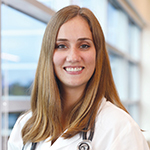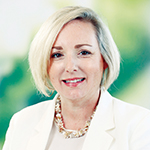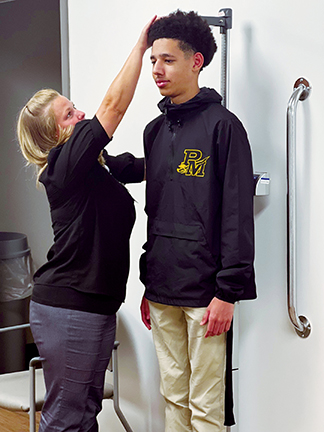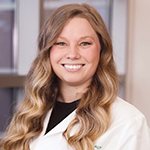By PATRICIA CORRIGAN

On a recent Tuesday, nurse practitioner Rachael Doll conducted a hospital follow-up exam on a 6-month-old, tested a 65-year-old for hypertension, performed a hearing evaluation and vaccinated several students. Doll works in a primary care clinic located inside Sayler Park School, one of six school-based health centers in Cincinnati operated by Mercy Health, part of Bon Secours Mercy Health.
Opened in November 2016, the Sayler Park clinic has two patient exam rooms, a room set up for virtual visits, a bathroom and plenty of laboratory equipment. Walk-ins are welcome, and appointments also are available.

Prior to opening the clinic at Sayler Park, Mercy Health operated clinics in two small inner city schools for students, their family members and school staff. "When Sayler Park took off, we saw the value provided by serving the health care needs of an entire community," said Liz Wilson, director of Medical Group Operations at Mercy. "Then we grew — and currently, the school-based clinics serve between 3,000 to 4,000 patients annually."
The newest, Mercy Health — Southwest Schools Community Clinic in Harrison, part of metropolitan Cincinnati, opened in August.
Through special arrangements with the schools, the clinics remain open year-round, operating from 7:30 a.m. to 4:30 p.m. Monday through Friday. Three of Mercy Health's school-based clinics represent partnerships with the Cincinnati Public School District; three more are partnerships with schools in Warren County and Clermont County, which are primarily rural areas.
Halo of trust
"Some of these schools are like magnets," Wilson said. "These are places where people trust the school and trust the staff, and we've been able to create relationships with the community while providing
access to primary health care." The clinics bill insurance companies for services, and parents are billed for co-pays so no students are expected to provide them. Patients who report financial difficulties are referred to Mercy Health's billing
department, which has a financial assistance program for those in need.

Wilson noted that if clinic workers learn that families have food insecurity issues, they can provide referrals to agencies that can help. "Many different health agencies — Catholic health care entities, federally qualified health centers and community health departments — work together to serve the school-based health centers in our area," she said. "It's a good consortium group, and we all get together to share best practices and help all people get the care they deserve."
The School-Based Health Alliance, a nonprofit organization based in Washington, reports that its 2016-2017 National Census Survey identified 2,584 school-based health centers in 48 states, the District of Columbia and Puerto Rico, providing access to more than 6.3 million students, which is about 13% of students nationwide.
Nearly two-thirds of the clinics provide services to populations beyond students. "Though the number of school-based health clinics has more than doubled since 1998, there are still only enough to meet a fraction of the overwhelming need," said Suzanne Mackey, vice president for policy and public affairs at the School-Based Health Alliance.
"The clinics have demonstrated their ability to increase access to health care, reduce emergency room use, lower Medicaid costs and increase the use of sensitive services like mental health counseling, and are considered an evidence-based intervention to improve educational and health outcomes in low-income communities," she said. Mackey added that data from a new survey, conducted over the summer, are being compiled.
Expertise and access
Students and their families who use the school-based clinic benefit in several ways, said Doll, who works with a medical assistant. "The school nurse can arrange same-day visits here, where
we can do exams and testing, write prescriptions and notify parents or guardians where to pick up any needed medications that may help get the student back to school as soon as possible," she said. "That eliminates the need to pick up the
student and set up a doctor's appointment elsewhere."
The Mercy Health school-based health centers participate in the national Vaccines for Children program and offer vaccinations for adults. "Also, we can help with physicals for children entering kindergarten and we also do sports physicals," Doll said. The local public schools offer a mental health care provider, family peer support and a therapist for students with anxiety, and Doll said she can set up a virtual visit with a psychologist at Mercy Health for adults.
Health education is another focus at the clinics. Doll said she provides a science lesson each year for second graders on the importance of handwashing and takes part in the school's annual Back to School Fair. She also has conducted sex education classes for teachers who requested this.

Alyse Knapp, the nurse practitioner who works at the new Southwest Schools Community Clinic, looks forward to providing health education sessions as well.
"On this campus, we have an elementary school, a junior high and a high school, and there are two additional elementary schools nearby," said Knapp. "I'm getting my name out to the school nurses and also encouraging Mercy Health's freestanding emergency room nearby to refer individuals who don't have primary care physicians."
After just a month on the job, Knapp reported, "I've handled a lot of sick visits and some well child exams, and I've seen some skin infections from football. Normal primary care will come later, and with every visit, we always educate about healthy eating, maintaining a healthy weight and healthy habits at home."
That adds up to a healthier future for everyone, Wilson said. "Plus, all our services reflect Mercy Health's mission, which is so strong regarding serving the poor and underserved, regardless of the ability to pay. That's what our school-based centers are here to do, especially in areas where there is a lack of primary care resources. If we can make even a small impact here, we've made huge strides."
Bishop David J. Bonnar of the Diocese of Youngstown, Ohio, blesses the COVID-19 memorial at Mercy Health — St. Elizabeth Youngstown Hospital at its dedication Sept. 8. In addition to the bronze sculpture designed by Timothy Schmalz, the
memorial includes a time capsule to be opened in 2120 — 100 years from the start of the pandemic. It also has a plaque that pays tribute to those who cared for COVID's victims, another that honors those who died from or were affected
by the virus, and a third meant to serve as a historical marker. "For more than two years, we have used words such as unprecedented and crises to describe what we have endured, so it is only fitting that we always remember this time and those
who perished due to this virus," Dr. John Luellen, president of Mercy Health — Youngstown, said at the dedication. Mercy Health — Youngstown is part of Bon Secours Mercy Health.
